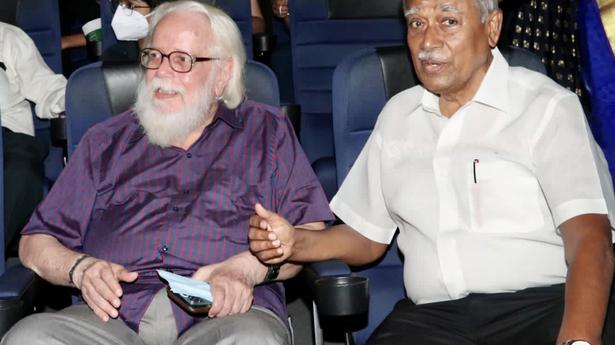
Scientists deserve immunity from arbitrary police action: Nambi Narayanan
The Hindu
Rocketry is intended to tell the truth to people about my contributions, sufferings, says former ISRO scientist
Scientists should be made immune from arbitrary police action such as registration of case or arrest, former Indian Space Research Organisation (ISRO) scientist Nambi Narayanan said here on Sunday. Clear-cut guidelines must be devised for the law enforcement agencies to deal with scientists.
On November 30, 1994, Mr. Nambi Narayanan, then head of ISRO’s Cryogenic Division, was arrested by the Kerala police on the charge that he had traded the country’s space secrets to foreign agents. It took more than two decades for him to prove his innocence in the fabricated spy scandal case. He was here for a special screening of Rocketry: The Nambi effect, a film based on his life.
“I think the scientific community needs some kind of immunity from such action. It is not just ISRO...scientists working in the Department of Science and Technology, the Department of Atomic Energy and others too. As part of their job, they travel a lot... They have to be protected from random police action...else you can go on booking people and put them behind the bars,” he said.
Mr. Nambi Narayanan felt that there was a possibility of an international plot in the case against him. The Americans were not interested in India getting the cryogenic technology. They said the India-Russian contract should be scrapped. His arrest came at a time when there was a political move to bring down the then Kerala Chief Minister, K. Karunakaran, and two Maldivian women were detained for overstaying. “All these things are independent links, but, unfortunately, they got linked in some manner. There is certainly a possibility of an international conspiracy, and it should be probed,” he told The Hindu.
But for the case, ISRO would have got the cryogenic technology much earlier, enhancing India’s ability to lift a higher payload. That would have been a great business opportunity to bring in a lot of money. “We are talking about a time frame of close to three decades, which is a very big period.”
Asked if his penchant for liquid fuel and cryogenic technology faded, Mr. Nambi said his priorities certainly changed after the arrest. “My priority was to come out clean, and it took more than 23 years. Though I returned to ISRO, I was put on a desk job. I think it was appropriate to do that... I would not have been in a commanding position with the allegations under investigation.”
He agreed to Rocketry because he wanted people to know his story. “Though it is known through court judgments, the clarity was not there with respect to my contributions, sufferings and why I got the Padma Bhushan award... I wanted the truth to be told in clear terms in a language understood by all. Today, I feel it has a tremendous impact on the minds of people.”





















 Run 3 Space | Play Space Running Game
Run 3 Space | Play Space Running Game Traffic Jam 3D | Online Racing Game
Traffic Jam 3D | Online Racing Game Duck Hunt | Play Old Classic Game
Duck Hunt | Play Old Classic Game











